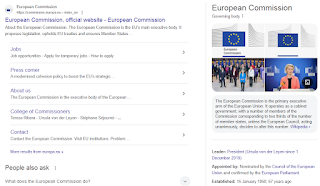 GENOCIDE AGAINST ME WAS USED SOLELY FOR POLITICAL EXTORTION PURPOSES AND IT RORKED AND IT WORKS FOR CRIMINAL GLOBAL CABAL. HERE YOU GET TO LEARN THROUGH FACTS ABOUT AMERICAN EUROPEAN DEMOCRACY ON HOW IT WORKS/OPERATES THROUGH BRITISH IMBECILISM
GENOCIDE AGAINST ME WAS USED SOLELY FOR POLITICAL EXTORTION PURPOSES AND IT RORKED AND IT WORKS FOR CRIMINAL GLOBAL CABAL. HERE YOU GET TO LEARN THROUGH FACTS ABOUT AMERICAN EUROPEAN DEMOCRACY ON HOW IT WORKS/OPERATES THROUGH BRITISH IMBECILISM
GET TO READ HER ARICLE BECAUSE THERE IS SOMETHING VERY VERY BAD HAPENING SOMEWHERE WITH SOMEONE - DOES SO TO DEMONSTRATE WORLD THAT SHE, HOWEVER, IS DOING HER JOB AND NOT DELIBERATELY FAILING ONE....CORRUPTION = 100% GOVERNMENT JOB WHEATHER THROUGH PRIVATE OR PUBLIC SECTORS MAIN CORRUPTION IS AT THE AGENCIES WHERE COMPLAINS ARE SUBMITTED TO AND NEVER RESOLVED AT SATISFACTION OF VICTIMS OF CRIME. RIGHT AT THE TOP AND IT DOESN'T GET ANY HIGHER THAN EUROPEAN COMMISSION
Anti-corruption
Corruption, commonly referred to as the abuse of entrusted power for private gain, is a multi-sector phenomenon, present both in the public and private sector, and in the political arena. While corruption can take the form of petty crime or complex high-level corruption, it can also hide behind favouritism and nepotism, conflicts of interest and revolving doors – where business meets politics.

I would like to focus on corruption, with all its faces. The face of foreign agents trying to influence our political system. The face of shady companies or foundations abusing public money. We must also eradicate corruption at home. That is why we will present measures to update our legislative framework for fighting corruption. It erodes trust in our institutions. So, we must fight back with the full force of the law.
Corruption is harmful to society. It constitutes a threat to security as it enables and drives organised crime, terrorism, and other forms of crimes, including money-laundering or drug trafficking. Corruption deepens inequalities, erodes citizens’ trust in public institutions, undermines good governance and social justice, and constitutes a serious threat to the rule of law, democracy, and fundamental rights. Corruption also has
a negative impact on prosperity and economic growth by creating business uncertainty, lowering investment levels, hampering fair competition and reducing public finances. It also adversely affects government objectives that focus on improving income disparity and environmental protection.
The European Union is one of the least corrupt regions in the world. However, none of the EU countries is fully free from corruption. Although its nature and scope may differ from one EU country to another, corruption harms the EU as a whole:
- Corruption is estimated to cost the European Union between EUR 179 billion and EUR 990 billion per year, amounting to up to 6% of its GDP.
- 70% of Europeans believe that corruption is widespread in their countries - an increase of 2 points compared to 2022 (2023 Corruption Eurobarometer Survey).
- 35% of EU businesses consider corruption to be a problem in doing business, (2023 Eurobarometer survey: Business’ attitudes towards corruption).
- 59% of EU business agree with the statement that bribery and the use of connections is often the easiest way to obtain certain public services, (2023 Eurobarometer survey: Business’ attitudes towards corruption).
On 3 May 2023, the Commission adopted anti-corruption package. This includes a proposal for a new Directive on combating corruption by criminal law. It aims to update and harmonise EU rules on definitions and penalties for corruption offences to ensure high standards against the full range of corruption crimes. It provides also for corruption prevention. Prevention helps to support a
culture of integrity, in which corruption and impunity are not tolerated.
The set of measures include new and strengthened rules criminalising corruption offences and harmonising penalties across the EU, as well as a dedicated Common Foreign and Security Policy (CFSP) sanctions regime to target serious acts of corruption worldwide. These new measures place a strong focus on prevention and creating a culture of integrity, in which corruption is not tolerated and at the same time, strengthen enforcement tools.
The Package includes a Joint Communication on the fight against Corruption, through which the Commission and the High Representative bring together existing work and develop new directions and new tools at both EU and Member State level, also feeding into a clear commitment to tackling corruption at the global level. An EU network against corruption, bringing together law enforcement, public authorities, practitioners, civil society and other stakeholders, will act as a catalyst for corruption prevention across the EU. One key task of the EU network will be to support the Commission to map common areas where corruption risks are high across the EU. The work of the EU network will feed into an EU anti-corruption strategy, to be developed in consultation with the European Parliament and the Council, to maximise the impact and coherence of EU actions.



.png)
.png)

.png)

No comments:
Post a Comment